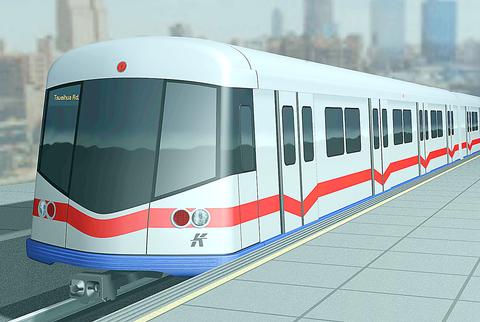Life in the city requires mobility. To guarantee this mobility, at the same time upholding quality of life, an effective and attractive local public transportation system is required.
Innovative cars for the Kaohsiung MRT system are developed and supplied by Siemens SGP Verkehrstechnik of Austria.
This same company that already supplied 216 metro cars for the Taipei MRT between 1996 and 1999, had several more successes recently -- in England, Siemens SGP Verkehrstechnik will deliver more than 600 cars to the Greater London Area, and over 36 cars will be supplied for the Metro Taipei as a consecutive order here.

PHOTO: AUSTRIAN TRADE DELEGATION TAIPEI
Just a few days ago, the company was also awarded the contract for the delivery of 42 units of three-car metro trains for the Kaohsiung MRT, a major infrastructure development project in Taiwan.
For the new metro system in Kao-hsiung with a contract value of 363 million Euro, about half of this budget is reserved for the cars. The metro cars are developed and manufactured in the Vienna works of Siemens SGP Verkehrstechnik, the bogies come from the Graz works of Siemens SGP.
Proven car design, state-of-the-art manufacturing technologies and the successfully completed large contract in Taipei were the reasons for being awarded the Kaohsiung contract. The first cars are scheduled to be delivered in 2005.

Right-wing political scientist Laura Fernandez on Sunday won Costa Rica’s presidential election by a landslide, after promising to crack down on rising violence linked to the cocaine trade. Fernandez’s nearest rival, economist Alvaro Ramos, conceded defeat as results showed the ruling party far exceeding the threshold of 40 percent needed to avoid a runoff. With 94 percent of polling stations counted, the political heir of outgoing Costa Rican President Rodrigo Chaves had captured 48.3 percent of the vote compared with Ramos’ 33.4 percent, the Supreme Electoral Tribunal said. As soon as the first results were announced, members of Fernandez’s Sovereign People’s Party

MORE RESPONSIBILITY: Draftees would be expected to fight alongside professional soldiers, likely requiring the transformation of some training brigades into combat units The armed forces are to start incorporating new conscripts into combined arms brigades this year to enhance combat readiness, the Executive Yuan’s latest policy report said. The new policy would affect Taiwanese men entering the military for their compulsory service, which was extended to one year under reforms by then-president Tsai Ing-wen (蔡英文) in 2022. The conscripts would be trained to operate machine guns, uncrewed aerial vehicles, anti-tank guided missile launchers and Stinger air defense systems, the report said, adding that the basic training would be lengthened to eight weeks. After basic training, conscripts would be sorted into infantry battalions that would take

GROWING AMBITIONS: The scale and tempo of the operations show that the Strait has become the core theater for China to expand its security interests, the report said Chinese military aircraft incursions around Taiwan have surged nearly 15-fold over the past five years, according to a report released yesterday by the Democratic Progressive Party’s (DPP) Department of China Affairs. Sorties in the Taiwan Strait were previously irregular, totaling 380 in 2020, but have since evolved into routine operations, the report showed. “This demonstrates that the Taiwan Strait has become both the starting point and testing ground for Beijing’s expansionist ambitions,” it said. Driven by military expansionism, China is systematically pursuing actions aimed at altering the regional “status quo,” the department said, adding that Taiwan represents the most critical link in China’s

‘REALLY PROUD’: Nvidia would not be possible without Taiwan, Huang said, adding that TSMC would be increasing its capacity by 100 percent Nvidia Corp CEO Jensen Huang (黃仁勳) on Saturday praised and lightly cajoled his major Taiwanese suppliers to produce more to help power strong demand for artificial intelligence (AI), capping a visit to the country of his birth, where he has been mobbed by adoring fans at every step. Speaking at an impromptu press conference in the rain outside a Taipei restaurant, where he had hosted suppliers for a “trillion-dollar dinner,” named after the market capitalization of those firms attending, Huang said this would be another good year for business. “TSMC needs to work very hard this year because I need a lot